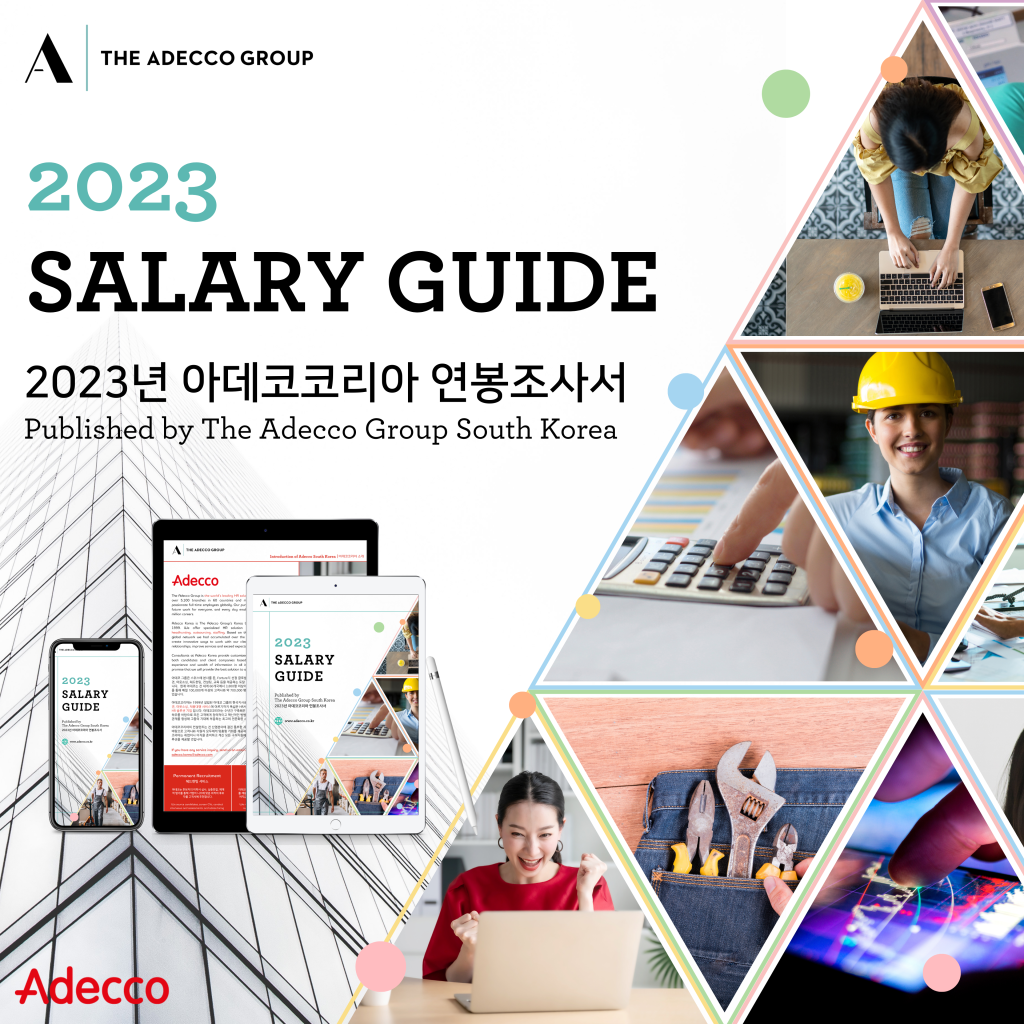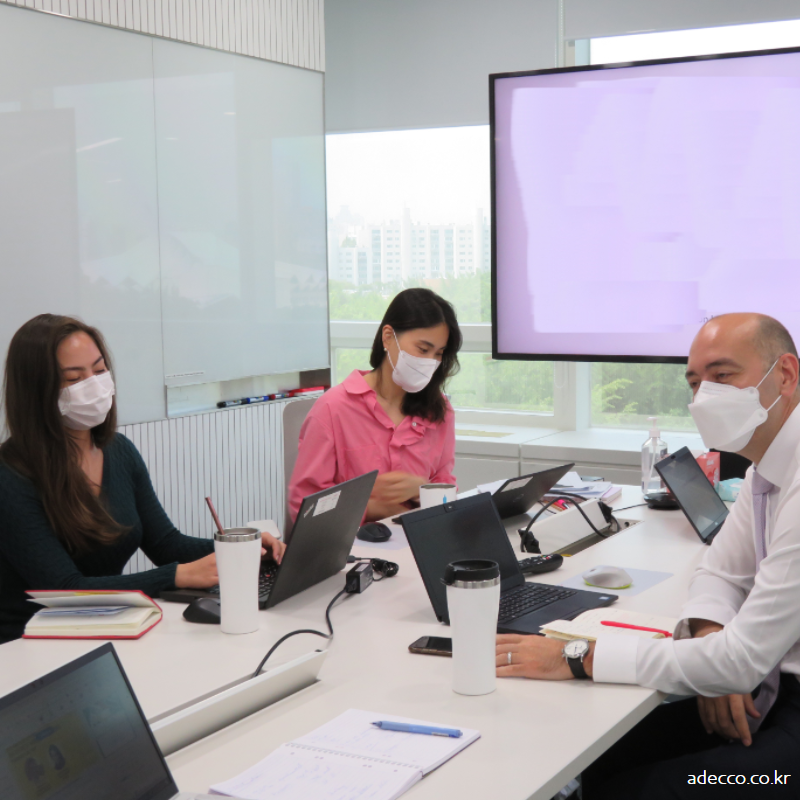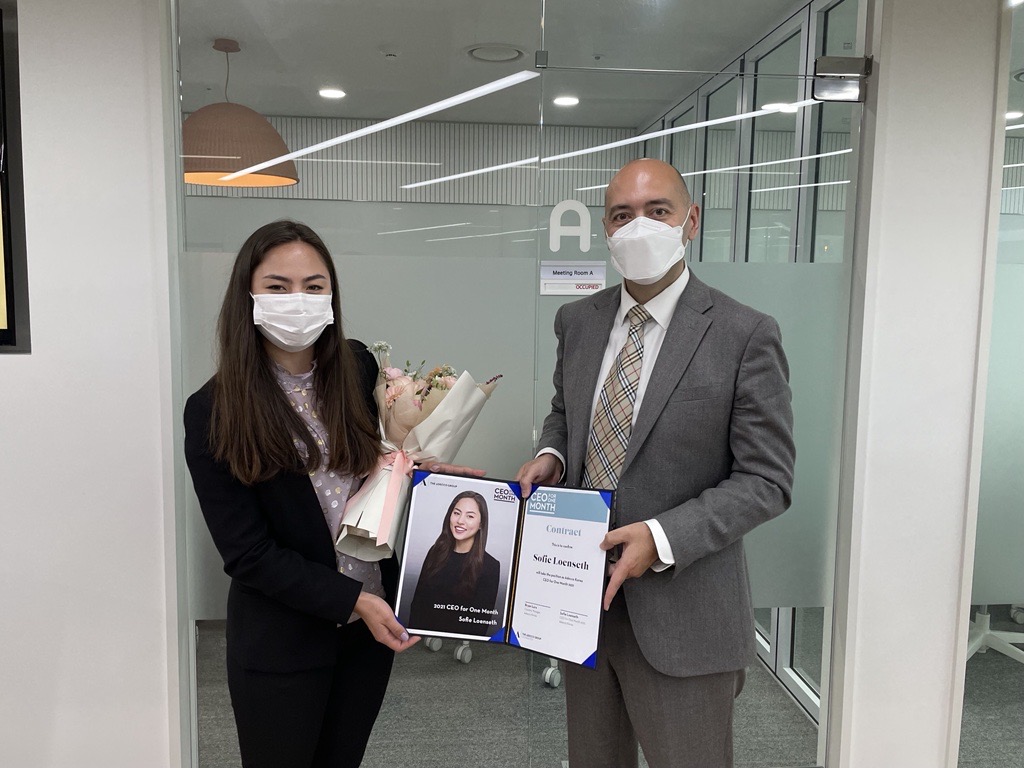
CEO insight about Korean economy and labor market in Covid-19 situation

Bryan Luro, the country manager of Adecco Korea presented his insight about Korean economy and labor market in Covid-19 situation.
The Adecco Group hosted a “COVID-19 Labor Market Insight” webinar about the pandemic and world labor market on 30th, November. Bryan Luro, the country manager of Adecco Korea participated in the webinar to present about the impact of pandemic on Korean economy and labor market in South Korea as the best model for an effective pandemic response and mitigation of the economic impact of the crisis. In the webinar, Bryan emphasized that Adecco Korea systematically managed associates, clients and internal employees to minimize the impact by the pandemic and he explained about the strategies that has been carried out in Adecco Korea in Covid-19 situation such as flexible working hours, extended lunch time and internal, external communication. He mentioned that Korean culture that think the group more importantly than individual enabled the “Test, Treat, Trace” policy to function effectively. Related to the labor market, Bryan says that permanent recruitment is definitely growing after the Q1 according the quick response from government. He said that clients are hiring again and they are looking for permanent employment rather than short term hiring. Please read below to check out the recommendation from The Adecco Group and more information about the Covid-19 webinar.
The Adecco Group’s latest Public Affairs’ analysis of governments’ response to COVID-19 in its October edition covers 20 countries and looks at macroeconomic and pandemic performance based on seven key indicators. The analysis leads to a ranking where countries land up in 4 different groups, with one country coming out on top – and thus the best model for an effective pandemic response and mitigation of the economic impact of the crisis: South Korea.
South Korea’s 3T strategy: Test, Trace, Treat
Initially one of the worst affected countries by COVID-19, South Korea was able to contain the outbreak very quickly via its 3T strategy of ‘Test, Trace, Treat’, which proved instrumental in avoiding the stringent national lockdowns seen across most Western markets, and in helping the country maintain a low fatality count and overall case-count. However, a number of other initiatives and interventions also played a role in a pandemic response that protected public health without devastating the economy.
Sangheon Lee, Director for Employment Policy at the ILO:
Sangheon Lee, Director for Employment Policy at the International Labour Organisation (ILO), says: “South Korea’s macro-economic response was solid and speedy, but also prudent and even too cautious to some observers. Compared to many other countries, the fiscal position of the South Korean government is solid, and because of that ample fiscal space disruption of the economy and labour market was relatively small, allowing them to be more active and more aggressive in tackling the key issues”.
“In supporting businesses, the South Korean government moved relatively quickly on wage subsidies, and mobilizing credit to sustain businesses. They also provided income support directly to the whole population, which has been key to maintaining consumer demand, and a third round of income support measures is now being discussed.”
Labour market concerns: Inactivity and inequality
However, he also points out some concerns around the country’s labour force and employment market, particularly around inactivity. “The labour market dynamics are finely balanced and we will have to wait to see the long term consequences,” says Lee. “However, I expect to see some scarring, particularly when it comes to women and younger people. These groups have suffered a lot, and if this damage continues for a year for example, they may have a hard time getting back to pre-pandemic levels.”
He also talked about inequality, a weakness in the South Korean labour market that was exposed by the pandemic, with a decline in the pay and working conditions of workers not in direct employment, including agency workers, platform workers and those in delivery services. “They have been the backbone of maintaining daily life during the pandemic, and there are concerns about their pay and working conditions,” says Lee. “Issues around inactivity, and labour market segmentation have created a very strong role for active labour market policies.”
Greater investment in job creation will be required, particularly in the healthcare, sustainability and digital sectors. The government also needs to maintain strong macro policies, especially fiscal policies. He says: ‘There is always a risk, as we saw after the last financial crisis, that as employment figures improve, fiscal policies become stricter, and we need to learn from that mistake. The key is not to tighten the fiscal belt too quickly on reaching the unemployment target, but to wait until the economy gets there.”
Bryan Luro, Adecco Group Country Manager for South Korea:
The government’s swift and effective response to the pandemic enabled organisations and their leaders to step up their own support of workers, customers, and business continuity, as Bryan Luro, Adecco Group country manager for South Korea, explains
“The measures that the government has put in place are clearly working, and confidence is returning to the recruitment market,” he says. “What we did at Adecco Group reflected government policy; being here for our associates and our clients, from provision of PPE, to alignment with the ‘Test, Trace, Treat’ policy, and ensuring that all our people are taken care of. Communication has been key, with regular company-wide feedback every month. Since February we have had zero cases of Covid-19 among our associates. Implementing flexible working hours has allowed people to avoid busy rush hour periods, and to take extended lunch hours. The result has been 90% satisfaction ratings from our people.”
One thing that the country has benefited from is the experience it gained from tackling the 2015 MERS epidemic. Immediately after this outbreak the South Korean government expanded legal and administrative boundaries regarding pandemic responses, for example, the Infectious Disease Control and Prevention Act was amended to prevent infectious disease and secure the public’s right to know through surveillance and tracing techniques. In this regard, Luro believes that cultural factors have played a part in South Korea’s success.
“In South Korea the group is more important than the individual, and therefore people are more accepting of restrictions and the sharing of personal data for the benefit of public health,” he says. “Also, the position of elders in society is quite different in Asian culture than in other parts of the world. Here, older people tend to live with their families, which makes people behave more responsibly in trying to protect them.”
As one of the first countries to be hit by the pandemic, South Korea’s permanent recruitment market was impacted during Q1, but as Luro points out, government’s approach has boosted confidence while its management of the economy during the crisis has given cause for optimism.
He says: “The government’s fast response also allowed us to act quickly. We are now seeing strong growth in permanent recruitment; clients are hiring again – permanent employment rather than short term hiring to address current needs, which is an indication that companies are reinvesting again, our portfolio is growing, and contracts are being renewed.”
Recommendations
The Adecco Group will continue to bring its visibility of labour market policy across the world into the policy making process as the world moves out of emergency response measures into the structural policy debate. As is, the learnings of the past months will be an inherent part of the architecture of the future. In the comparative study, the Adecco Group points out 4 key recommendations:
#1.Keep up economic activity
While workers’ health and safety is the absolute baseline and the unique specificity to this crisis, it is becoming apparent that every week without economic activity exponentially increases the negative economic impact of the crisis, and the potential for economic recovery.
#2. Social peace
More than any crisis before, this pandemic demands the cooperation of all country decision makers. The rankings confirm that those countries with a model of social dialogue based on negotiation and not confrontation are faring best, importantly also with regards to trust in the political process and consumer confidence, needed to accelerate the pace towards economic growth.
#3.Support employment
Short-time working schemes and other measures to support continuing work are effective. For example, since May, Japan has introduced its Employment Adjustment Subsidy, reducing the cost of labour. Subsequently, unemployment rose 37,5%, which was a step up from initial estimates of an 80% rise. Practice shows that the implementation of those schemes varies from country to country in terms of inclusiveness, volume and duration. Those countries who in addition already had adequate social protection systems in place, to create security and predictability, are faring best under this indicator.
#4. Trigger Active Labour Market Policies:
As further interventions may be necessary and when prolonging existing support measures, countries should start to link instruments for skills development as conditions for continued access to wage subsidy schemes. Supporting skills development and other elements of active labour market policies such as supported recruitment in essential sectors and employability-oriented services to maintain labour market attachment allow for quicker redeployment of workers whose jobs are on the verge of disappearing or lost already. Countries should maintain or increase funding for ALMPs providers as lockdowns are eased and recovery begins, to support effective transitions in the labour market.






